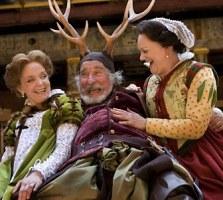The Merry Wives of Windor Review 2010
The Kings and Rogues season at the Globe could easily, at least in part, be subtitled as 'A Tale of Two Falstaffs'. Because the infamous, yet loveable Sir John Falstaff appears in three of the season's plays, but is tackled very differently by Roger Allam in Henry IV Parts 1 and 2, and here in 'The Merry Wives of Windsor' by Christopher Benjamin. In Allam's Falstaff we discover a character who is essentially an intelligent rogue, but doesn't quite have quite the girth we've come to expect. On the other hand, Christopher Benjamin's Falstaff is a more traditional as well as a more physically substantial rendition of the 'fat knight'.
'The Merry Wives of Windsor' was first performed sometime around the 1590s, and is still one of the most popular of Shakespeare's comedies. This version was first seen at the Globe in 2008 and, after its present run ends, is destined for a UK and international tour. I missed this production the first time round, but there were rave reviews about it at the time. I suspect the same will be true of this revival because it's a well-directed, vibrant romp that is at times quite hilarious.
Christopher Benjamin's fat-bellied, ruddy-cheeked, sack-drinking Falstaff suffers from the delusion that two married women find him irresistible as a potential sexual partner. He decides to write love letters to Mrs Page and Mrs Ford who, on receiving Falstaff's amorous entreaties, concoct a plot to have their revenge on him. In a sub-plot, Anne Page has three suitors - the young, handsome and athletic Fenton (Anne's choice for a husband), the dim-witted Slender (Anne's father's choice), and the French Dr Caius (Anne's mother's choice).
It's easy to see why this play is compared with TV sitcoms, given the farcical nature of the plot, and the strong visual humour, for example when Falstaff has to dress as the witch of Brentford to escape Mr Ford's wrath. But in this production the link with TV sitcom is not only acknowledged, it's also incorporated in a very explicit way. Those familiar with the BBC TV comedy series 'Fawlty Towers' will recognise instantly many of the quirky mannerisms of the principal character, Basil Fawlty, in Andrew Havill's playing of Frank Ford. Suspicious of his wife's intentions with respect to Falstaff, Ford assumes a disguise to find out exactly what is going on. As he gets more incensed with Falstaff and what he believes to be his wife's dalliance, he shakes his fist in the air in exactly the same way which John Cleese did on numerous occasions when playing Fawlty. 'Borrwing' mannerisms from a TV character might not be to everyone's taste, but in fact it made Havill's Ford even funnier.
Christopher Benjamin's Falstaff may be a more traditional variant of Falstaff than Roger Allam's, but it's nevertheless deliciously appealing and funny. And there's excellent support from William Belchambers as the feeble-minded Slender, Philip Bird as the French Dr Caius who hasn't yet mastered the English language, Sue Wallace as the go-between, Mistress Quickly, and Serena Evans and Sarah Woodward as the two wives (Meg Page and Alice Ford) who make an excellent pair of schemers and are more than a match for Falstaff or any other man, for that matter.
As with many of the Globe's productions, music plays an important part in this show. Shawms, lutes, curtals, citterns and other strange-sounding musical instruments are employed to provide the accompaniment which assumes something of the role of a film soundtrack, or the kind of music used in melodrama. But there's also a delightful and charming duet between Anne page (played by Ceri-Lyn Cissone) and one of her suitors, Fenton, (played by Gerard McCarthy).
The wives of Windsor manage to con Falstaff not once but three times, which some may regard as stretching believability. But this is a farcical comedy and you can get away with almost anything in that arena. For those who find Shakespeare hard to digest, 'The Merry Wives of Windsor' actually provides the chance to enjoy Shakespeare without causing too much brain ache in decoding the language. The prose is clear and explicit, the plot is easy to follow and an excellent vehicle for an introduction to Shakespeare's comedy. The audience seemed to agree with that, and gave the venture a big thumbs-up, and deservedly so.
"An accessible and nicely paced production."
Henry Hitchings for The Evening Standard
"The real joy is not simply the farce of the situation, but the intelligence of construction that allows an actor to play the comedy for its full value."
Paul Vale for The Stage
"Delightfully alert and amusing production...I cannot recommend it too highly."
Charles Spencer for The Daily Telegraph
External links to full reviews from popular press
Telegraph
Originally published on
